Alright folks, the 2018 Oscars are officially over. The Shape of Water won best picture, Get Out had the best original screenplay, and Coco received the honor for best animated feature. And I am just so disheartened, my long standing faith in Hollywood award shows utterly in shambles.
To be fair, I knew this disappointment was coming. The finest movie of this award season had been left off the list of nominees some time ago. But hearing the winners reopened these wounds, because damnit…The Emoji Movie could have easily gone toe-to-toe with these guys.
For those who are unaware, this Sony Pictures film recently won a “Razzie” for the worst movie, and even before that became rather infamous given the 9% critic rating on Rotten Tomatoes, complete with some downright disturbing reviews.

Naturally we at The Fandomentals participated in a liveblog of it on Halloween, only to find that…it wasn’t…particularly…bad? I do think it could have used a script doctor, as well as a five-year-old standing in a corner repeatedly asking “why,” but honestly the ideas and themes introduced were kind of good. Seriously.
Quick review of the main plot ?
So, first of all, divorce yourself of any genre expectations you might have going into an animated children’s movies about emojis. This is a corporate drama sci-fi dystopia.
With that, let’s chat the story. Our protagonist, Gene Meh, is the smilie emoji we use when we feel “meh” about something. I think it’s the one I used in the title of this article, but frankly between the five different platforms I view emojis on, I’m not positive. Gene rather bemoans his role. There’s a lot of pressure on face emojis, because they actually have to evince that emotion every time their user calls upon them. A bike emoji is always a bike, but Gene? What if he’s feeling happy? Or angry? Well, he has to repress that, of course.
“It’s hard to always act blase, when living in Textopolis is just so exciting.”
Now, I should point out a few things. One, this is his job. Actually, we’re introduced to Gene Meh on the first day of his job inside “The Cube,” the matrix array in which emojis sit before being selected by the phone user. His parents, Mel Meh and Mary Meh, are old pros at the face, but he feels it’s his time and he’s finally ready. And if he can do well, then maybe he’ll finally fit into the place, where everyone else is apparently excellent at only having one emotion.
As luck would have it, the kid who owns the cellphone (Alex) inside which Gene’s Textopolis exists tries to text someone the “meh” emoji on his first day. And Gene…fails. He has an anxiety attack, fails horribly, and poor Alex sends a mixed signal to the girl he likes.

Text message ruined.
The company the emojis all work for (unnamed, but the suggestion is that Textopolis is sort of their corporate campus, so we could pretend it’s just “Textopolis” too) is headed by Smiler, who is utterly terrifying. And there’s also the suggestion that every single cellphone has an Evil, Inc. living inside of it.

Smiler calls Gene into her office after this incident. She concludes that his failure to perform is some kind of virus (probably), and attempts to murder him on the spot with Anti-Virus Bots. As luck would have it, Gene gets rescued by what looks to be the Hamburger Helper mascot voiced by James Corden. Er…I’m sorry, “Hi-5.” Though he displays quite the array of hand signals. He says they need to find a hacker to fix Gene, who lives in the “Piracy” app. A quick search on the Google Play store is only giving me results for apps that help hide texts and videos—I imagine for affairs—but I’m not here to judge the hacker.
As it turns out, the hacker is a girl named “Jailbreak,” with blue hair and a beanie, so we know she’s the real deal. She tells Gene that he needs to get uploaded to the cloud in order to be reprogrammed (that’s where the source code lives?), and their ticket out of the phone and into the cloud is the Dropbox app.
To get to Dropbox, the trio (Hamburger Helper is still there) travels through the Just Dance app, where Gene teaches Jailbreak some moves.
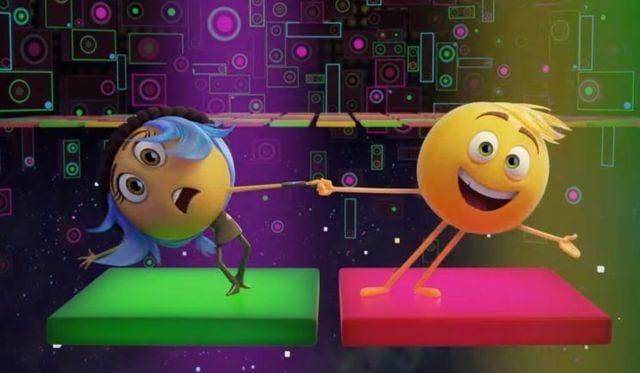
Her beanie falls off to reveal that she’s actually a Princess emoji (Princess Linda, specifically), which to the movie’s credit was seeded before the five minute dance sequence, back when Hi-5 was trying to convince Gene to leave Textopolis:
Hi-5: One of the Princess emojis left the phone altogether. Now she lives on the cloud.
Before Gene can do much with this revelation, they’re attacked by the bots again. This makes Alex’s phone fritz, so he deletes the Just Dance app along with Hi-5. Savage. That leaves just Jailbreak (Linda?) and Gene, who head over to Spotify, which is en route to the trash. Jailbreak admits she never got to the cloud, but really wants to because of how constraining life in Textopolis is. She also likes Gene for who he is, not the “meh” he is supposed to be programmed as.
The two rescue Hi-5, but an upgraded bot attacks them, which is a pretty accurate portrayal of iPhone ownership. The gang runs away and finally reaches Dropbox, but there’s a firewall. It’s, naturally, literal.

The password is the name of the girl Alex likes, and Hi-5 learned it because he read one of Alex’s trashed emails, which had included the high-five emoji.
“Dear Addie, you and I, we’re like diamonds in the sky. You’re a shooting star I see, a vision of ecstasy. Shine bright like a diamond.”
(Dear Addie: your crush is emailing you lyrics to a Rihanna song as a method of flirting).
So, with the firewall deactivated because “Addie” was not-creepily the password, the three enter the cloud. Jailbreak (hesitantly) prepares to reprogram Gene, until he busts out of the place, with a declaration of his feelings.
“Jailbreak, you’re the coolest, most interesting emoji I’ve ever met. And after all the adventures that we had, I’m just not sure I want all that to go away, because my feelings right now are, like, huge. I just think that they could be enough for me to want to stay the way I am. If it means I could stay here with you. Like, forever.”
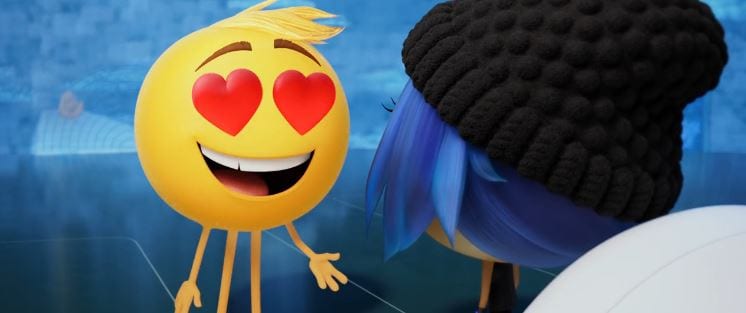
She tells him that’s nice, but she has her own things to do. She just wanted to explore the cloud without any kind of romantic pressure. This rejection actually turns Gene into a true “meh,” and he gets captured by the upgraded bot. Unfortunately that’s when Jailbreak realizes that Gene is more important to her than the cloud, so she and Hi-5 go after him.
Smiler is about to delete the now-meh Gene when his parents show up, and Mel reveals to Smiler that he too has the capacity for multiple expressions! Logically, Smiler decides to have the bot delete him in addition to Gene, but then Jailbreak and Hi-5 crash the place. Jailbreak hacks the bot to reveal the power button, but she gets thrown across the room, so Hi-5 presses it to power it off. “Hand…button.” The bot crushes Smiler and breaks her teeth.
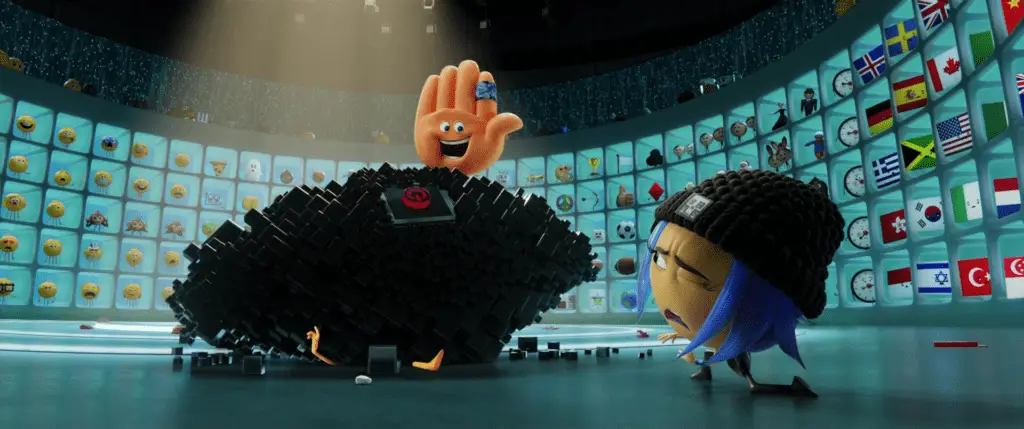
Alex, meanwhile, takes his phone to the Apple Store to get it factory rebooted. They decide that if they can somehow get Alex to win over Addie before the phone gets wiped, then they’ll all be saved. Therefore it’s up to Gene to perform a vast number of faces that can capture the complexity of human emotion. Also Smiler is Jailbreak’s mom. Just thought you should know.
Anyway, Gene successfully performs a range of emotions in what can only be described as an emoji gif, and Addie compliments Alex on it, who unplugs his phone and pockets it again.

This means Gene saved the day! And Jailbreak takes over as the leader of Textopolis Co. Everyone has a dance party, where Gene and Jailbreak formally begin their relationship. The end.
Holy subplots, Batman ?
So…a lot happens. Like, we’re talking a 90 minute kids movie here, and I just gave you the short, short version. I should also note though that in addition to Gene’s plotline, we get full character arcs for everyone else introduced.
Hi-5: Though this character becomes the easiest to write-off, James Corden’s hand actually has a bit of texture. You see, no one uses a high-five emoji anymore, since the more contemporary fist-bump now exists. Hi-5 only joins Gene in the first place as an attempt to reclaim his former glory as one of the most used emojis.
It’s true, Hi-5 is a little klutzy and not particularly detail-oriented, but when the pressure hits, he recalls the email to Addie on the spot. He also disables the bot, and with Jailbreak taking over the company, he gets a place front and center in the grid again. Which is sort of nepotism, but at the same time he follows Campbell’s monomyth rather closely. Hell, he even has a death and rebirth with the trash adventure.
Jailbreak/Linda: Princess “Jailbreak” Linda is not exactly a dutiful princess, but she has her own demons and certainly isolates herself emotionally. Her main issue is the oppressive nature of Textopolis, particularly with regards to constrained roles and lack of opportunity for women.
“Did you realize that on the first emoji set, a woman can either be a princess or a bride? That’s why I need to get to the cloud, where you can be whoever you want to be.”
If only she could murder people and wear their faces for true social mobility.
She’s utterly determined to break free of Textopolis, interestingly running away from her duty as not just a princess emoji, but the daughter of Smiler, specifically. She wants to wander around the cloud with no particular direction or attachment, though comes to learn that this stance is driven as much out of fear as Gene’s anxiety surrounding his expression of emotions. What’s strong is actually prioritizing the people she cares about, and embracing a new path for emojis everywhere.
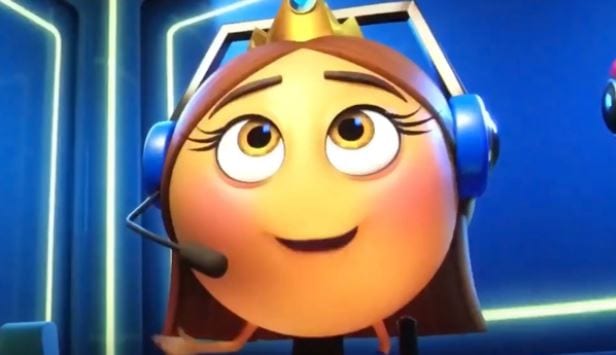
She ends up taking her “rightful place on the throne” so to speak (no seriously, nepotism), and does so in a way that carves rulership out for herself. She begins the movie a jaded loner who thinks she needs to detatch entirely from the system, only to end the movie understanding that she can reform it from within. Running away does not institutional reform make.
Mel and Mary Meh: I didn’t summarize this at all, but Gene’s parents have marital problems in the middle of this movie. See, they both tried to protect Gene from the grid, telling him that he wasn’t ready for the pressure. When Gene fails, Mary blames both herself for failing as a parent and Mel, suspecting that her husband is keeping something from her.
“I think we should go our separate ways, Mel. I thought I knew the Meh that I married, but maybe I don’t.”
The couple makes up in Instagram, where Mel finally admits that he too has other expressions that he’s repressed. The thought of losing both Gene and Mary were too much, and it makes him shed a tear. Mary loves him for this honesty and display of passion, though it should be noted both these characters have muted, lethargic reactions to everything to highlight the way they’ve been forced to conform within Textopolis.
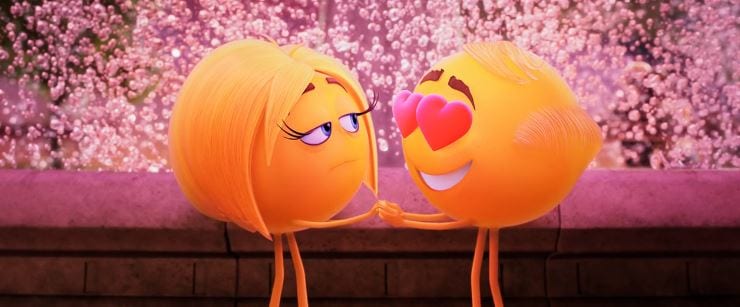
Their arc concludes when Mel tries to save his son, embracing the “malfunction,” with Mary right behind him. They’re proud of Gene for who he is. It’s mostly a symbolic gesture, since Smiler is fine deleting Mel too, but they both willingly stand between the death blast and Gene, Mel telling his son that he should have believed in him all along. Also when they get temporarily deleted, that’s a large part of how Gene gets his emotions back.
Alex: Everything that plays out in the phone has a meta level to it for Alex, the phone owner. See, he has a crush on Addie, but rather than expressing himself through pop songs released in 2012 sent via email, he swallows his feelings. However, Gene’s performance as a multi-faceted emoji with a range of emotions is something he finds personally moving, and he sends it to his crush right on the spot. The movie ends with him understanding that he shouldn’t bottle up his own feelings, just like Gene.
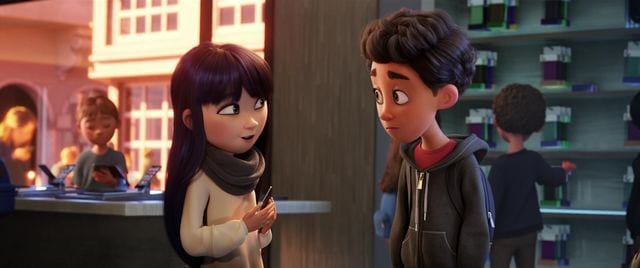
The only other character worth a mention is Smiler, our antagonist. She runs Textopolis truly believing that emojis have one function and cannot go against this programming. Now, it’s pretty clear that a lot of her worldview was shaped by the fact that her own daughter ran off rather than putting on the performance of a princess, and her often maniacal control over her employees his her hashing out these demons. She gets worse as the movie goes on, likely because she’s losing even more control (and even threatens a poor Patrick Stewart ? emoji). Her defeat comes when her own function (SMILING) is taken away from her.
Free of that role, we see her in a mid-credits sequence, full of braces, playing cards with other emojis. Her daughter now has her former burdens, and there’s a space for healing since she no longer needs to rely on her performative grin as a means of work.
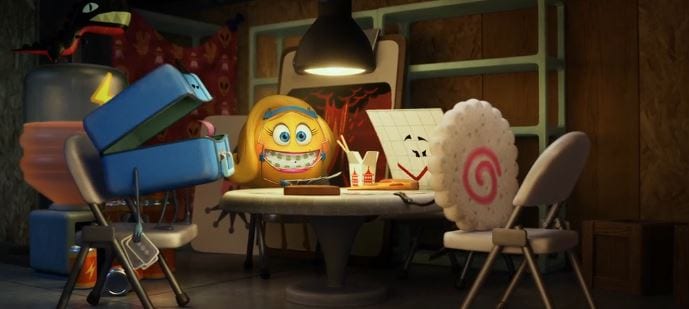
Those are really all the major/named characters in The Emoji Movie, and frankly that they all had arcs makes it a relatively more involved movie than some.
Themes and dystopia ?
It should be obvious that the main theme of this film was about the power of emotions. The Emoji Movie offers a rather poignant critique of toxic masculinity, since the entire dystopia was based around a society where boys receive negative feedback for having strong, passionate emotions. IMAGINE SUCH A WORLD.
Normally, I roll my eyes at default male protagonists, especially when a princess in disguise seems like a better central figure. However, it was intentional and effective to have the journey be through Gene Meh, someone on the cusp of manhood based on his actions, who was struggling with his ability to fit in. He wanted to be a man, or a “pro” like his parents, only to find out that his father’s “meh” demeanor was performative too. His father had repressed everything, as society asked of him, and in doing so, he endangered his son and nearly lost his wife.
Jailbreak’s refusal of Gene’s love declaration might feel counter to this critique, except we learn that she was acting from a place of insecurity too. Gene sort of reached the thematic center of his arc earlier than she did. This is not a strictly bad thing, however, since the movie’s overarching thesis statement required a condemnation of all of Textopolis. Therefore, we not only saw the personal epiphany Gene reached, but we see how his unconventional and genuine feelings shaped those around him and pushed them towards growth: from Jailbreak to his parents.
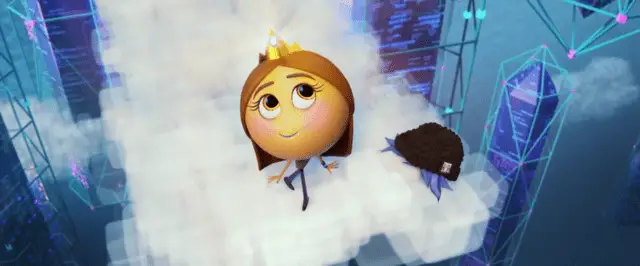
And of course, Gene’s final test was to perform under pressure in The Grid, where he had failed before. It solidifies his coming of age story in a kind of formulaic way, but since his proof of “manhood” was an external display of vulnerability for the first time (at least, intentionally so), it works within the broader picture.
Jailbreak for herself represents the oppression of women that naturally occurs from a society where emotions are stamped out. While she’s allowed to evince anger, or happiness, or love (that’s nearly expected of her), she notes how Textopolis’s foundations are rooted in restrictive misogyny, which is why she thinks she needs to divorce entirely from that society. She very readily points out common issues, even to Gene who is certainly not trying to keep her down in any way; he was just born into a system where some things occur that he doesn’t think about.
“I wanted to say it, ‘cause it was my idea. You know, women are always coming up with stuff that men are taking credit for.”
She embraces Gene’s sensitivities right away, but is personally guarded, likely because of the very gendered expectations placed on her. She’s a damn literal princess. There’s a slightly negative implication that Gene’s expressiveness is completely tied to his romantic interest, since when she rejects him he turns into a true “meh.” However, within the context, his emotional state is framed more as being about authenticity, and it’d make sense that her inauthentic (repressed) reaction would make him question his (newly acquired) worldview, especially. Plus, this implication is definitely lessened given the part his father plays in his regaining emotions at the end.
It might seem counterintuitive, then, that given the gendered commentary, the villain is a woman; you’d think a frownie-face male boss would drive home the point about toxic masculinity and a false conception of stoicism as strength better. However, Smiler does represent the overly oppressive patriarchy in the fact that she is so specifically gendered. We see shots of her taking care of her teeth, demonstrating vanity, as well as a meticulousness to her image—she yells at Poop Jr. not to touch her. She is performative, compulsory femininity (an inextricable part of such a patriarchal world) taken to the extreme, right down to the “smile!” expectations. She insists she is “always happy,” yet her actions demonstrate extreme anxiety and desperation.
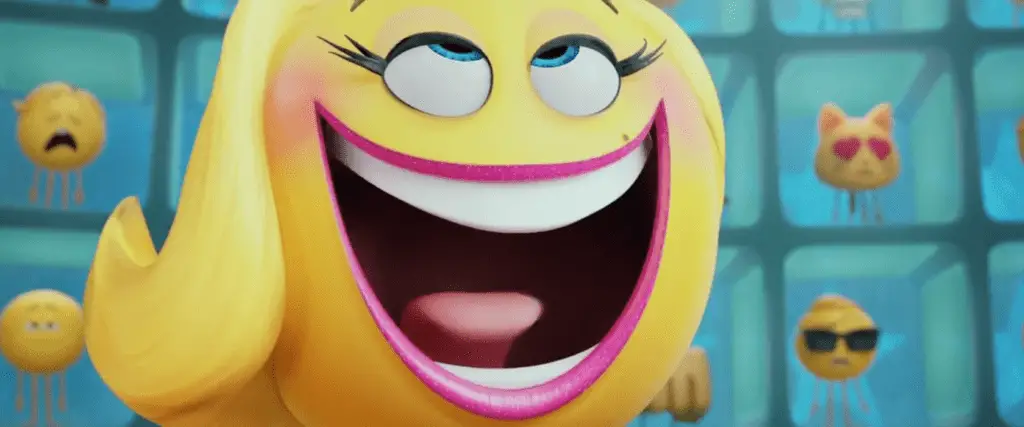
It’s fitting and profound that it’s her daughter who takes her place and recontextualizes what proper princess—and by extension women—expression is. And of course, the conclusion is the same for Jailbreak as it is for Gene and his parents and even Alex: be yourself, and strive for emotional honesty. That’s really all any of us can do. It’s not a condemnation of feminity or masculinity, but instead of disingenuous/compulsory expressions of gender.
Hi-5 is the only odd-man out. He has an arc about obsolescence that he overcomes by…supporting the “malfuctioning” emojis? I’d argue a more poignant note would have been if he accepted that he may not have a starring role, but he can still serve as support for a greater good. However, his triumph isn’t exactly a problem, nor counter to anything, as much as treated slightly separated. This is not uncommon for comic-relief characters.
Overall, The Emoji Movie’s greatest success is that its dystopia is disturbingly familiar. Textopolis is certainly exaggerated to our own society, but there’s a reason we see Gene’s struggles mirrored in the real world with Alex. Will a flashy emoji gif really help any of us? I mean, weirder things have happened. But it’s more what that represents: don’t be afraid to display your full range of emotions and express how it is you really feel. Addie says as much to Alex, in a neatly packaged thesis statement for the film:
“A lot of feelings in one. I get it. I like that you’re one of those guys who can actually express his feelings.”
Now please, dear readers, explain to me: how can The Shape of Water even possibly hold a candle to this moving, uplifting, relevant, and relatable tale? Yes, I understand that half the movie was essentially an advertisement for various apps, the pacing was atrocious, Jailbreak’s personality kind of boiled down to “girl with hacker skills who’s there,” Patrick Stewart was used as a turd, and there’s gaping plot holes like how unplugging a phone after half your data is deleted wouldn’t magically restore it. But looking beyond those small notes, there’s something pretty dang worthy here.
It was robbed, I say…ROBBED!

